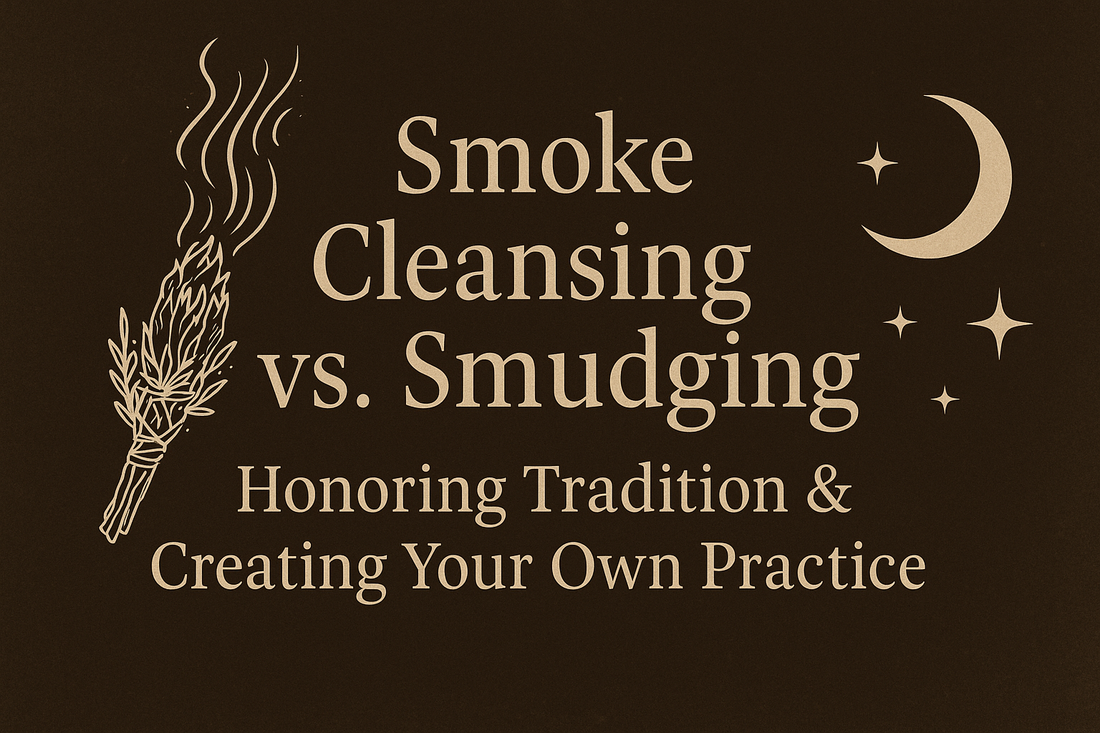
Smoke Cleansing vs. Smudging: Honoring Tradition & Creating Your Own Practice
Share
Cleansing rituals are a sacred part of many spiritual paths, offering a way to clear energy, release what no longer serves us, and invite protection and peace. But it's important to understand the difference between smudging and smoke cleansing, especially when it comes to cultural respect and spiritual integrity.
This post explores the history and meaning behind these practices, why white sage should be avoided, and which herbs you can use instead—plus their unique properties and purposes.
What Is Smudging?
Smudging is a sacred ceremonial practice rooted in the spiritual traditions of various Indigenous nations across North America. Specific herbs—especially white sage, cedar, sweetgrass, and tobacco—are used in smudging ceremonies to purify, heal, and connect with Spirit.
These rituals are not just energetic—they're deeply cultural and religious acts. Using white sage or calling your own practice "smudging" without being part of those communities can unintentionally appropriate and disrespect Indigenous cultures.
What Is Smoke Cleansing?
Smoke cleansing is a more universal, non-culturally-specific ritual. It involves burning herbs, resins, or incense to energetically cleanse a space, object, or person. While it may look similar to smudging on the surface, smoke cleansing is distinct and not tied to protected ceremonial practices.
By choosing alternative herbs and using appropriate language, we can build practices that are respectful, intentional, and deeply meaningful.
Why Avoid White Sage?
White sage (Salvia apiana) is sacred to several Indigenous cultures. Due to overharvesting and misuse in commercial spiritual markets, it’s now considered endangered in some areas and its spiritual use has been heavily commodified.
Unless you are a member of a tribe where smudging is an ancestral and living tradition, it’s best to avoid using white sage entirely and instead explore ethical alternatives.
Respectful Alternatives: Herbs for Smoke Cleansing
These herbs are commonly found in metaphysical shops and can be safely used in your personal practice:
Rosemary
- Purpose: Cleansing, protection, memory, and ancestral work
- Notes: A powerful and accessible alternative. Rosemary purifies energy while strengthening the auric field.
Garden Sage (Salvia officinalis)
- Purpose: Emotional healing, general cleansing, and grounding
- Notes: Unlike white sage, garden sage is culinary-safe and spiritually effective without cultural ties.
Blue Sage
- Purpose: Spiritual strength, healing, and light cleansing
- Notes: Gentler in scent and energy, it’s a great alternative that’s widely available.
Juniper
- Purpose: Protection, new beginnings, and energetic clearing
- Notes: Traditionally used for banishing and warding. Great when moving into new spaces or beginning a new cycle.
Lavender
-
Purpose: Peace, relaxation, emotional clarity, and dreamwork
-
Notes: Use when you need a calming, soothing cleanse—especially helpful before bed or meditation.
Mugwort
- Purpose: Intuition, divination, dream recall
- Notes: Perfect for enhancing spiritual awareness and connecting to the subconscious.
Cedar
- Purpose: Deep purification, protection, and grounding
- Notes: Especially helpful when working with ancestral or earth-based rituals.
Pine
- Purpose: Strength, resilience, renewal
- Notes: Pine needles or bundled twigs can be used to refresh your energy and clear away lingering heaviness.
Cinnamon Sticks
- Purpose: Abundance, attraction, protection
- Notes: A great fire-aligned herb to boost energy and intentions.
Important Note on Dragon’s Blood Sage
Many “Dragon’s Blood Sage” bundles sold commercially are white sage coated in resin powder, which defeats the purpose if you're trying to avoid white sage. Always check the labels and look for bundles made with garden sage, blue sage, or other non-sacred herbs.
Why I Use the Term “Smoke Cleansing”
Language matters. Out of deep respect for Indigenous cultures, I use the term smoke cleansing rather than smudging. While I perform similar energetic rituals, I do not claim the cultural lineage or ceremonial rights associated with smudging. This distinction helps honor both my practice and the sacred traditions of others.
My Final Thoughts
You can absolutely have a powerful, grounded, and effective cleansing practice—without appropriating sacred Indigenous rituals. Choosing the right herbs, being intentional with your words, and understanding the spiritual roots of your practice are all acts of respect and integrity.

